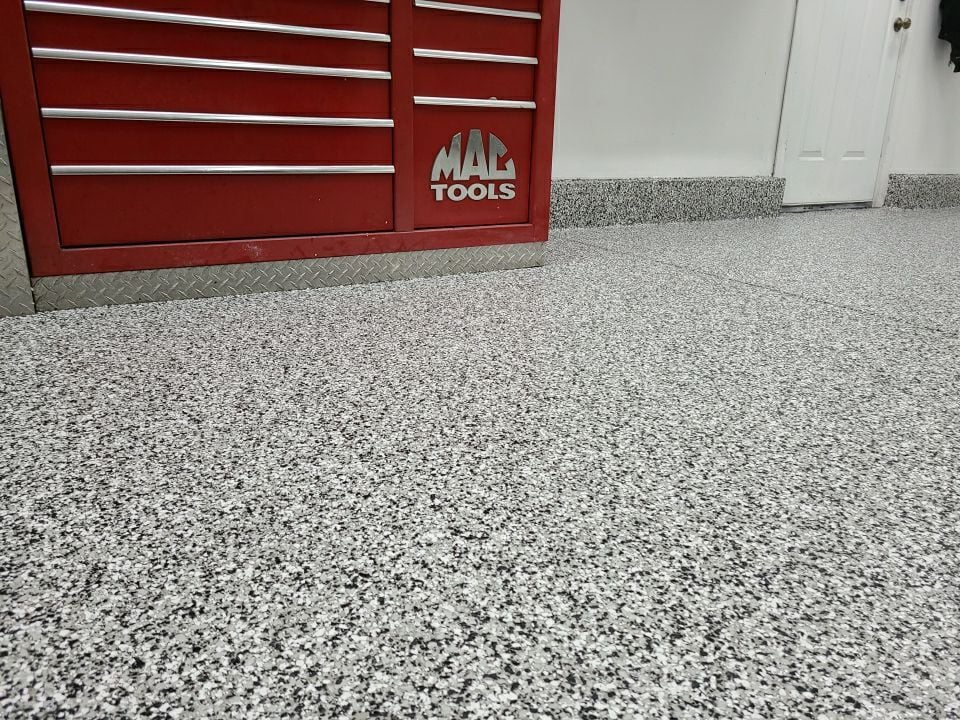If you are the owner of a commercial business and have a showroom, it is essential to use the best concrete coating that goes well with the showroom look. No beautiful showroom is complete without decorative flooring that draws the customer’s attention to the space and flows out comfortably for the rest of the area.
Whether you are selling furniture, apparel, or cars, it is essential to choose the showroom floor coatings that benefit your company and help to increase the amount of business your store receives.
Here are four best concrete coating options that are best for your showroom:
1. Epoxy floor coating
Epoxy floor coating systems are made up of two distinct elements: a polyamine hardener and epoxy resin. The two components are mixed before the application. With the combination of hardener and resin, they engage in a chemical reaction that creates cross-linking of the elements as it cures. The result of the chemical reaction is rigid, hardened plastic coating material that bonds well to most base layers.
Epoxy floor coatings are famous for their impact resistance, durability, and hardness. These characteristics make epoxy coatings ideal for heavy-duty applications like logistics centers, warehouses, industrial facilities, and other areas that may be subjected to heavy forklift traffic. Epoxy is also known for its resistance to chemical products like cleaners, greases, oils, bleach, etc. The chemical resistance makes them a known choice not only in showrooms but also in garages.
The only disadvantage of the epoxy floor coating is that the application process is challenging. Surface preparation could be tedious. Epoxy flooring cannot be applied to unprepared, damaged, or contaminated surfaces.
2. Polyurethane Floor coatings
Polyurethanes are polymers that connect with a chemical compound group known as carbamates. Polyurethane is a thermosetting polymer by nature. It means that it does not melt when heated. For the untrained eyes, polyurethane coatings may appear visually similar to epoxy-coated floors. However, it possesses distinct characteristics that make them ideal for specific applications.
Unlike epoxy coatings, polyurethane floor coatings are usually softer and more elastic. The attribute makes the floor coating better suited for moderate to high pedestrian traffic areas. The increased elasticity makes the floor coating more resistant to abrasion, as the impact loads are easily absorbed and less prone to cause scratches. The flexibility and elasticity of polyurethane also contribute to operating in environments with low freezing temperatures.
3. Polyaspartic Floor Coatings
Polyaspartic is a known subset of polyurea. Like the polyurea floor coatings, polyaspartic coatings are also a two-part system. The simple meaning is the resin needs to be combined with a catalyst to facilitate the hardening and curing process. While the early variations of polyaspartic floor coatings possessed many shortcomings, innovations in floor coating technology made these floor coatings a versatile alternative to polyurethane and epoxy coating systems.
One of the primary benefits of the polyaspartic floor coating is that it has the ability that is helpful as an option for a complete flooring system and topcoat. In other words, polyaspartic floor coatings can quickly achieve in a single coat, while polyurethane and traditional epoxy would typically take two coats to accomplish. Polyaspartics can also significantly help to reduce the application time, material, and labor costs.
4. Acrylic Floor Coatings
Most acrylic floor coatings are made with more than one monomer, like butyl acrylate, methyl methacrylate, or ethyl acrylate. These components are often processed in a solvent (usually water). These floor coatings offer a middle ground in terms of performance and cost.
Acrylic floor coatings are not quite durable as their polyurethane or epoxy counterparts. They may also need to be recoated or buffed more frequently than the other coatings. Therefore, even though the initial cost of the acrylic floor coatings could be relatively inexpensive, long-term maintenance costs could be higher than those for the other coatings.
These shortcomings are why acrylic floor coatings are suited best for surfaces with minimal foot traffic, decorative concrete, and areas with minimal risks of chemical spills or abrasions.
Conclusion
Concrete floor coatings offer unique benefits and properties that lend themselves to different applications. Several factors, like durability requirements, environmental conditions, and anticipated traffic, must be carefully considered to determine the type of concrete floor coating most appropriate for any specific project.
If you are still unable to decide, contact Transylvania concrete coatings today. The experts will give you the proper consultation on which floor coating could be the best for your showroom.

